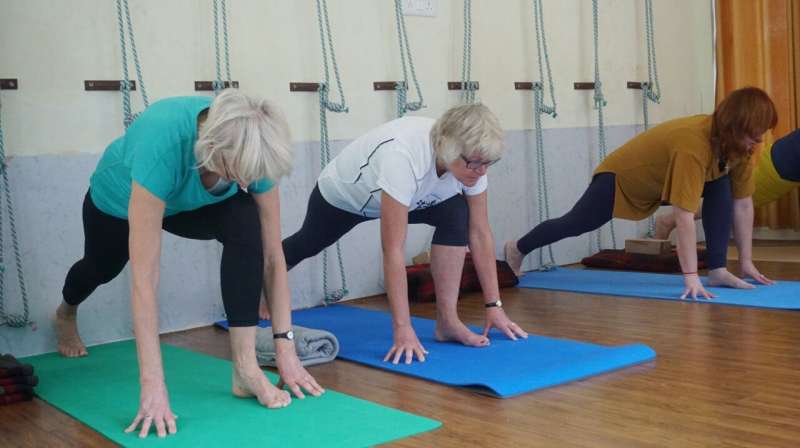Study Finds Iyengar Yoga May Increase Fall Risk in Older Adults

A groundbreaking study reveals that Iyengar yoga may unintentionally increase fall risk among older adults, highlighting the importance of tailored exercise for seniors.
A recent comprehensive study conducted by researchers at the University of Sydney has revealed unexpected findings about a commonly practiced yoga style among seniors. The study investigated the effects of an Iyengar yoga-based exercise program on fall incidence in people aged 60 and older. Surprisingly, the results showed that participants engaging in Iyengar yoga experienced a 33% increase in falls compared to those following a relaxation-based yoga program.
Published in the Lancet Healthy Longevity, the study involved 700 older adults who were newly introduced to yoga. Participants were randomly assigned to either participate in online, instructor-led Iyengar yoga sessions or follow a self-guided seated relaxation yoga routine. The 12-month trial aimed to assess the impact of these activities on fall frequency.
Iyengar yoga was selected because of its emphasis on holding poses for longer durations with the aid of props such as blocks and chairs, making it seem suitable for the elderly. Despite this, researchers found a counterintuitive increase in falls among those practicing Iyengar yoga. Notably, certain groups—such as individuals who had never fallen before, those with high activity levels, and those confident in their balance—were more vulnerable.
Experts suggest several reasons for this unexpected outcome. Professor Anne Tiedemann hypothesized that increased confidence gained from practicing yoga might lead participants to undertake more risky activities outside class, thus elevating fall risk. Additionally, the stationary nature of Iyengar yoga, with its focus on holding poses, may not adequately challenge dynamic balance skills needed for daily life. Delivery mode may also have influenced results, as the online classes lacked the physical supervision present in in-person sessions, possibly limiting the intensity and safety of practice.
Nevertheless, the study found that participants in the yoga group improved in other areas of health, such as strength and confidence in mobility, highlighting that yoga can have positive health benefits—even if not ideal for fall prevention when taught remotely.
The findings emphasize the complexity of fall prevention in older adults, suggesting that more dynamic balance exercises like squats, lunges, and heel raises might be more effective. The research underscores the importance of tailored exercise programs and professional guidance, especially when considering online formats during circumstances like the COVID-19 pandemic.
Older adults interested in practicing yoga should consult healthcare professionals to ensure safe participation. While Iyengar yoga may not be recommended solely for fall prevention, it can contribute positively to other aspects of health. Overall, maintaining an active lifestyle with a focus on balance and strength remains vital for minimizing fall risks in the aging population.
Source: https://medicalxpress.com/news/2025-09-popular-yoga-linked-higher-falls.html
Stay Updated with Mia's Feed
Get the latest health & wellness insights delivered straight to your inbox.
Related Articles
Is 7,000 Steps a Day Sufficient for Good Health? Insights from Recent Research
Recent research suggests that walking 7,000 steps daily offers significant health benefits, reducing risks for chronic diseases and increasing longevity. Learn how achievable step goals can improve your health.
Caffeine Intake During Exercise Enhances Performance in Hot Conditions Without Increasing Physiological Strain
New research indicates that drinking caffeine during exercise in hot conditions can boost endurance without increasing physiological stress, offering a promising strategy for athletes and active individuals.
Do Compression Tights and Tops Enhance Exercise Performance and Recovery?
Learn whether compression tights and tops truly enhance exercise performance and aid recovery, supported by scientific research and expert insights.
How Brief Cold Stress Can Help Your Brain Reinterpret Physical Challenges During Exercise
Learn how brief, controlled cold stress can recalibrate your brain and make challenging workouts feel more manageable, boosting resilience and enjoyment.



